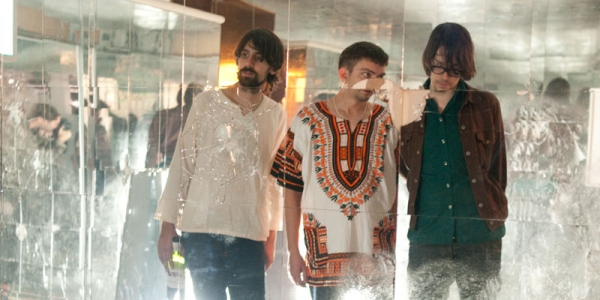“It’s not a necessary part of our show whatsoever,” says Lille from his Los Angeles studio, after asked if drugs are indeed an element of the Dead Meadow aesthetic. “You know, it’s a weird stigma. Stoner rock is such a weird name; there’s something about it that’s very caveman like. There are other bands I’ve spoken to that don’t dig that tag as well. There are other veins of music we were inspired by, and there might be more crucial ways to call our music. The music that inspires us comes from the ‘60s, and we’d much rather be associated with that than anything else. It’s definitely an unfortunate term to be throwing out there.”
Lille may not be a fan of labels, yet given Dead Meadow’s history, you’d have to think he wouldn’t mind being if his band was called exactly as they are: a live band.
Though they’ve release six studio albums, their last studio release was 2008’s Old Growth. A live album and film, Three Kings, came in 2010, but for the most part, Dead Meadow has been touring as of late simply for the love of it.
“Being an experimental band, you certainly reach new ground when you play live. You get close when you go into the studio, but there’s something about playing a few shows in a row that does that to you. The more you play, the more the audience responds to you. It’s great to have the ability to capture some of that when recording. And when you put out a live album, you’re trying to do both. We recorded our last live album at the end of a long tour. There are some jams and some solos in there that never would’ve happened at the beginning of the tour, and certainly never would’ve happened if they were forced.”
“I think considering the kind of music we play,” he continues, “and maybe considering the ilk of the crowd we draw in, that sort of psychedelic music and its following, it’s all really based upon the live show. When you do have a new record out, it does tremendous things for the live show but doesn’t always have to. You know, we always come off tour feeling like successful, but it’s tough to get people to hear about your new music when it comes out.”
For Lille and Dead Meadow, the only way to get people to hear their music is simply to tour without restraint. Since 2007, the band has gigged exclusively as a three-piece. Though through this touring, they’ve managed to create a bombastic, sprawling sound that is certainly much larger than the sum of its parts. Lille maintains that live, it’s paramount to allow their songs room to grow.
“I think all great bands allow for a certain level of growth,” he says. “You don’t necessarily have to be jamming and going through a ton of guitar solos and drum solos and all that, but you have to give your music room and space to develop. You also have to allow honest people to hear your music, so that their opinions might be able to add to the music. Every band and artist that gets better does so from putting themselves out there, into the public. The energy of the crowd will always change your music.”
It’s a noble concept to believe in. Yet outside of the sanctity of a live venue, Dead Meadow must still try to exist alongside bands that churn out shorter, catchier tracks that capture your average music fan’s attention with much more ease. How easy it would be then to put Dead Meadow into a corner and hand them another oft-taboo label: a niche band.
Instead, as far as “indie” bands go, they’re lumped into the upper echelon; signed to perennial tastemakers Matador Records, Lille admits that Dead Meadow are in a bit off a tricky spot.
“We’ve followed in the footsteps of a lot of people that’ve gone before us. Even if we’re kind of stuck in this rubber band, we’re still trying to push our style as much as we can. We’re not trying to reinvent the wheel, but we’re constantly trying to put our own spin on things. You’re always trying to hint at your personality and the little quirks that only you can bring. The voice that you speak with.”
It’s a voice that Dead Meadow aims to perfect through their live show. And in a sense, it’s a timeless one.
“Despite the fact that we’re influenced by the past, we live in a modern world when it comes to music. We won’t go completely modern, as that will totally change who we are. We fit in modern music as we’re modern people that are trying to interpret music of the past.
BY JOSHUA KLOKE

